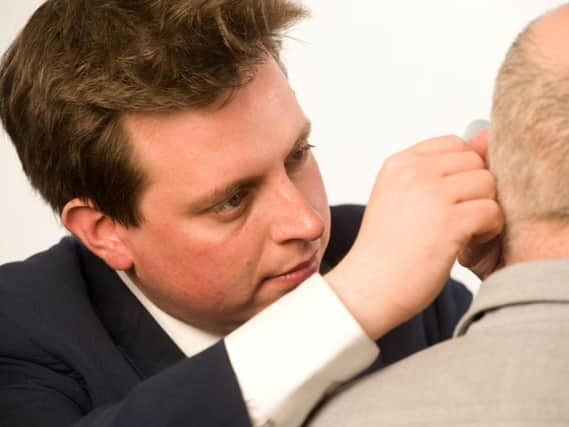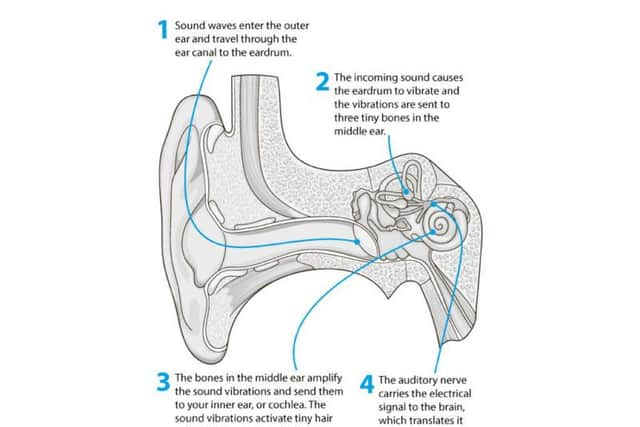Time to tackle tinnitus for Yorkshire's 430,000 sufferers


Others experience a low-frequency buzz, while some people hear a high-pitched ringing.
The sounds caused by tinnitus can vary from person to person - every individual has their own very personal tinnitus tone.
Advertisement
Hide AdAdvertisement
Hide AdBut it’s a condition which affects more than 430,000 people across Yorkshire and the Humber.
Specialist audiologists at The Tinnitus Clinic in Leeds are happy to discuss concerns about tinnitus and hearing loss. Tel: 0203 326 1777, e-mail [email protected] or visit www.thetinnitusclinic.co.uk/our-clinics/leeds.
VIDEO: The Tinnitus Clinic launches pioneering treatment in Yorkshire - CLICK HERE.
The word tinnitus is derived from the Latin verb tinnire, meaning ‘to ring’ and is defined as a conscious awareness of a sound in the ears or head that is not due to an external noise.
Advertisement
Hide AdAdvertisement
Hide AdTinnitus can be caused by exposure to loud noise, ear or head injuries, ear diseases or infections, emotional stress, and as a side effect of medication. It often occurs in conjunction with an auditory impairment, such as hearing loss.


While there is currently no cure for tinnitus, there are a number of therapies that can help to reduce the effects.
Despite this, a poll of patients we recently carried out at The Tinnitus Clinic - the leading provider of exclusive evidence-based tinnitus treatments in the UK - found 91 per cent of respondents were told by their healthcare professional that their tinnitus would be something they’d have to ‘learn to live with’ or ‘get used to’.
More than 80 per cent of respondents also reported feeling ‘disappointed’ about their options for treating the condition after consulting their doctor, while 90 per cent did not feel they were given sufficient health advice and guidance for their symptoms.
Advertisement
Hide AdAdvertisement
Hide AdThe Tinnitus Clinic has published a GP Guide, with input and contributions from doctors and other healthcare professionals, as a resource to help the healthcare industry better understand the condition and what can be done to help those affected.


Patients across Yorkshire can also benefit from a Leeds city centre clinic run by The Tinnitus Clinic. Based at Joseph’s Well, the clinic enables people living with tinnitus across the region and beyond to benefit from our full range of state-of the-art products and treatments.
Treatments are designed to work at either the origin of the phantom sounds or on the negative effect they have on the patient.
We only select the treatments and devices that show the strongest scientific evidence and highest chance of a successful outcome.
Advertisement
Hide AdAdvertisement
Hide AdAs no two people’s experience of tinnitus is the same, there are a range of bespoke devices and therapy programmes on offer. Your tinnitus is personal to you so your audiologist will be able to advise on the best course of treatment to significantly reduce your own particular symptoms.
DIGITAL HEARING AIDS FOR TINNITUS
These devices can help to reduce the prominence of a patient’s tinnitus signal while improving their hearing ability and have become a standard intervention for those with bothersome tinnitus and hearing loss.
LEVO®
The Levo® System is exclusive to the UK and available exclusively at the Tinnitus Clinic.
It has been developed for patients who have tinnitus that is very high or very low in pitch and uses iPod technology to deliver a personalised tinnitus sound straight to the brain while the patient sleeps.
Advertisement
Hide AdAdvertisement
Hide AdLevo® has been specifically designed to be used during sleep because our brains are more likely to be responsive to and influenced by sound therapies. As a result, the brain learns to ignore the hissing or buzzing and, over time, the patient notices the tinnitus less during the day.
ACOUSTIC NEUROMODULATION
This type of sound-based therapy works on the nerve cells within the hearing centre of the brain.
It is an innovative therapy that reduces the hyperactivity of the nerve cells producing the phantom sounds and over time reduces the intensity and loudness of the tinnitus.
TINNITUS DESENSITISATION THERAPY™ (TDT)
This is a therapeutic pathway specially designed by The Tinnitus Clinic for patients who suffer with invasive tinnitus.
Advertisement
Hide AdAdvertisement
Hide AdTDT uses a number of distinct therapeutic techniques together to control tinnitus awareness with the long-term goal of redirecting the brain’s attention away from the signal. This means, over time, you become progressively less aware of your symptoms.
COGNITIVE BEHAVIOURAL THERAPY (CBT)
A form of psychological counselling designed to reduce the patient’s negative emotional reaction to the tinnitus noise. CBT has been reported to reduce tinnitus-related distress in clinical trial reviews.
SURGERY
A small number of patients experience a pulsing or clicking noise which runs in time with their heartbeat. This is called pulsatile tinnitus which can be caused by blood vessels that have become narrowed within the head or neck, generating sounds as blood flows through them.
Pulsatile tinnitus can sometimes be helped by surgical procedures that are designed to remove fatty deposits or tumours.
Advertisement
Hide AdAdvertisement
Hide AdSpecialist audiologists at The Tinnitus Clinic in Leeds are happy to discuss your concerns about tinnitus and hearing loss. Tel: 0203 326 1777, e-mail [email protected] or visit www.thetinnitusclinic.co.uk/our-clinics/leeds.